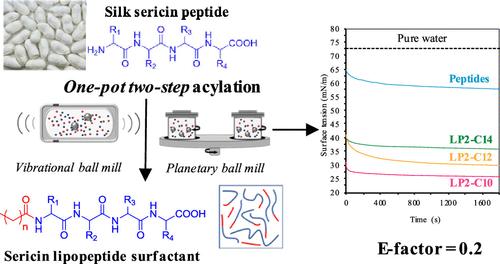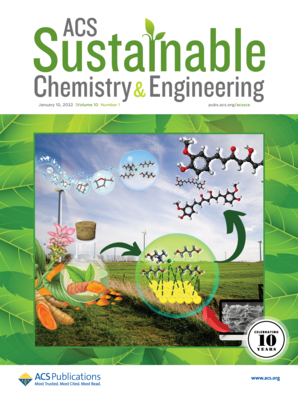Green Strategy for Sustainable Silk Lipopeptide Production using Mechanochemistry
IF 7.1
1区 化学
Q1 CHEMISTRY, MULTIDISCIPLINARY
引用次数: 0
Abstract
A mechanochemical approach to peptide N-acylation was used for silk sericin lipopeptide production. A one-pot, two-step method with 1,1′-carbonyldiimidazole (CDI) fatty acid activation, followed by acylation, was implemented. First, the procedure was optimized on model amino acids such as leucine, glycine, serine, and aspartic acid using two different types of ball mill equipment: a vibrational ball mill and a planetary ball mill. High conversion rates of 99% were observed for amino acid acylation under optimal conditions with both types. Then, grafting hydrophobic chains on to two different silk sericin hydrolysates was studied. The peptide acylation rate of 48–51% was obtained with three fatty acids with chain lengths of 10, 12, and 14. Lipopeptides obtained using the mechanochemical methodology showed good surface activity and reduced surface tension of up to 26 mN/m. The advantage of the proposed approach compared to conventional Schotten–Baumann N-acylation was confirmed with green metrics calculation.

求助全文
约1分钟内获得全文
求助全文
来源期刊

ACS Sustainable Chemistry & Engineering
CHEMISTRY, MULTIDISCIPLINARY-ENGINEERING, CHEMICAL
CiteScore
13.80
自引率
4.80%
发文量
1470
审稿时长
1.7 months
期刊介绍:
ACS Sustainable Chemistry & Engineering is a prestigious weekly peer-reviewed scientific journal published by the American Chemical Society. Dedicated to advancing the principles of green chemistry and green engineering, it covers a wide array of research topics including green chemistry, green engineering, biomass, alternative energy, and life cycle assessment.
The journal welcomes submissions in various formats, including Letters, Articles, Features, and Perspectives (Reviews), that address the challenges of sustainability in the chemical enterprise and contribute to the advancement of sustainable practices. Join us in shaping the future of sustainable chemistry and engineering.
 求助内容:
求助内容: 应助结果提醒方式:
应助结果提醒方式:


